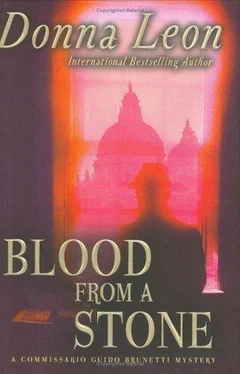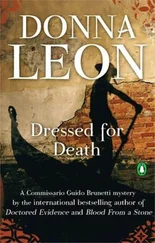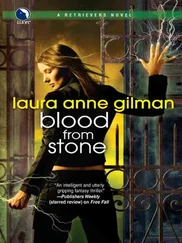Donna Leon - Blood from a stone
Здесь есть возможность читать онлайн «Donna Leon - Blood from a stone» весь текст электронной книги совершенно бесплатно (целиком полную версию без сокращений). В некоторых случаях можно слушать аудио, скачать через торрент в формате fb2 и присутствует краткое содержание. Год выпуска: 2005, Жанр: Детектив, на русском языке. Описание произведения, (предисловие) а так же отзывы посетителей доступны на портале библиотеки ЛибКат.
- Название:Blood from a stone
- Автор:
- Жанр:
- Год:2005
- ISBN:нет данных
- Рейтинг книги:4 / 5. Голосов: 1
-
Избранное:Добавить в избранное
- Отзывы:
-
Ваша оценка:
- 80
- 1
- 2
- 3
- 4
- 5
Blood from a stone: краткое содержание, описание и аннотация
Предлагаем к чтению аннотацию, описание, краткое содержание или предисловие (зависит от того, что написал сам автор книги «Blood from a stone»). Если вы не нашли необходимую информацию о книге — напишите в комментариях, мы постараемся отыскать её.
Blood from a stone — читать онлайн бесплатно полную книгу (весь текст) целиком
Ниже представлен текст книги, разбитый по страницам. Система сохранения места последней прочитанной страницы, позволяет с удобством читать онлайн бесплатно книгу «Blood from a stone», без необходимости каждый раз заново искать на чём Вы остановились. Поставьте закладку, и сможете в любой момент перейти на страницу, на которой закончили чтение.
Интервал:
Закладка:
They both repeated his name, and the man said, ‘Sorry, Commissario. I didn’t hear your rank when you came in. I hope you didn’t mind being called officer.’
‘Not at all,’ Brunetti said with a smile. They shook hands, and Brunetti stood and watched them until they had disappeared beyond the corner of the church.
When he returned to the place where the man had been killed, he found a uniformed officer standing beside one of the stanchions. He saw Brunetti approach and saluted. ‘You alone here?’ Brunetti asked. He noticed that all of the sheets and the few bags that had remained had disappeared and wondered if the police had taken them back with them.
‘Yes, sir. Santini said to tell you he didn’t find anything.’ Brunetti assumed this meant not only shell casings, but any traces of whoever might have killed the man.
He looked at the enclosed area and only then noticed an oval mound of sawdust in the centre. Without thinking, he asked, nodding towards it with his chin, ‘What’s that?’
‘It’s the, er, blood, sir,’ the man answered. ‘Because of the cold.’
The image this conjured up was so grotesque that Brunetti refused to consider it; instead, he told the officer to call the Questura at midnight and remind them that he was to be relieved at one. He asked the young man if he wanted to go and have a coffee before the bar closed and then stood and waited for him.
When the uniformed man was back, Brunetti told him that, if he saw any of the other vu cumprà , he was to tell them that their colleague was dead and ask them to call the police if they had any information about him. He made a particular point of telling the officer to make it clear to them that they would not have to give their names or come to the Questura and that all the police wanted from them was information.
Brunetti used his telefonino to call the Questura. He gave his name, repeated what he had just told the crime scene officer, emphasizing that callers were not to be asked their names, and instructed that all calls relating to the shooting were to be recorded. He called the Carabinieri and, unsure of his authority, asked their cooperation in treating any relevant calls they might receive with the same discretion, and when the maresciallo agreed, asked if they would record their calls as well. The maresciallo observed he was very doubtful that any information would be volunteered by the vu cumprà but nevertheless agreed to do so.
There seemed little else for Brunetti to do, so he wished the young officer a good evening, hoped it would get no colder, and, having decided it would be faster to walk, turned towards Rialto and home.
4
Paola sat, mouth agape, fearing that everything she had ever tried to do as a parent had failed miserably and she had produced a monster, not a child. She stared at her daughter, her baby, her bright, shining angel, and wondered if demonic possession were possible.
Up until that point, dinner had been a normal enough affair, at least as normal as a meal can be when it has been delayed by murder. Brunetti, who had been called from home only minutes before they sat down, had phoned a little after nine, saying he would still be some time. The children’s complaints that they were on the verge of expiring from hunger had by then worn down Paola’s resistance, so she fed them, putting her own dinner and Guido’s back in the oven to keep warm. She sat with the children, sipping idly from a glass of prosecco that gradually grew warm and flat as the children ate their way through enormous portions of a pasticcio made of layers of polenta, ragù, and parmigiano. To follow there was only roasted radicchio smothered in stracchino, though Paola marvelled that either one of her children could possibly eat anything else.
‘Why’s he always have to be late?’ Chiara complained as she reached for the radicchio.
‘He’s not always late,’ a literal-minded Paola answered.
‘It seems that way,’ Chiara said, selecting two long stalks and lifting them on to her plate, then carefully spooning melted cheese on top.
‘He said he’d be here as soon as he could.’
‘It’s not like it’s so important or anything, is it? That he has to be so late?’ Chiara asked.
Paola had explained the reason for their father’s absence, and so she found Chiara’s remark not a little strange.
‘I thought I told you someone was killed,’ she said mildly.
‘Yes, but it was only a vu cumprà ,’ Chiara said as she picked up her knife.
It was at this remark that Paola’s mouth fell open. She picked up her glass of wine, pretended to take a sip, moved the platter of radicchio towards Raffi, who appeared not to have heard his sister, and asked, ‘What do you mean by, “only”, Chiara?’ Her voice, she was glad to note, was entirely conversational.
‘Just what I said, that it wasn’t one of us,’ her daughter answered.
Paola tried to identify sarcasm or some attempt to provoke her in Chiara’s response, but there was no hint of either. Chiara’s tone, in fact, seemed to echo her own in terms of calm dispassion.
‘By “us”, do you mean Italians or all white people, Chiara?’ she asked.
‘No,’ Chiara said. ‘Europeans.’
‘Ah, of course,’ Paola answered, picking up her glass and toying with the stem for a moment before setting it down, untasted. ‘And where are the borders of Europe?’ she finally asked.
‘What, Mamma ?’ asked Chiara, who had been answering a question put to her by Raffi. ‘I didn’t hear you.’
‘I asked where the borders of Europe were.’
‘Oh, you know that, Mamma . It’s in all the books.’ Before Paola could say anything, Chiara asked, ‘Is there any dessert?’
As a young mother, Paola, herself an only child and without any previous experience of small children, had read all the books and manuals that gave modern parents advice on how to treat their children. She had, further, read many books of psychology, and knew that there was a general professional consensus that one should never subject a child to severe criticism until the reasons for their behaviour or words had been explored and examined, and even then, the parent was enjoined to take into consideration the possibility of damaging the developing psyche of the child.
‘That’s the most disgusting, heartless thing I’ve ever heard said at this table, and I am ashamed to have raised a child capable of saying it,’ she said.
Raffi, who had tuned in only when his radar registered his mother’s tone, dropped his fork. Chiara’s mouth fell open in a mirror of her mother’s expression, and for much the same reason: shock and horror that a person so fundamental to her happiness could be capable of such speech. Like her mother, she dismissed even the possibility of diplomacy and demanded, ‘What’s that supposed to mean?’
‘It’s supposed to mean that vu cumpràs are not only anything. You can’t dismiss them as if their deaths don’t matter.’
Chiara heard her mother’s words; more significantly, she felt the force of her mother’s tone, and so she said, ‘That’s not what I meant.’
‘I’ve no idea what you meant, Chiara, but what you said was that the dead man was only a vu cumprà . And you’d have to do a lot of explaining to make me believe that there’s any difference between what those words say and what they mean .’
Chiara set her fork down on her plate and asked, ‘May I go to my room?’
Raffi, his own fork motionless in his hand, turned his head back and forth between them, confused that Chiara had said what she did and stunned by the power of his mother’s response.
Читать дальшеИнтервал:
Закладка:
Похожие книги на «Blood from a stone»
Представляем Вашему вниманию похожие книги на «Blood from a stone» списком для выбора. Мы отобрали схожую по названию и смыслу литературу в надежде предоставить читателям больше вариантов отыскать новые, интересные, ещё непрочитанные произведения.
Обсуждение, отзывы о книге «Blood from a stone» и просто собственные мнения читателей. Оставьте ваши комментарии, напишите, что Вы думаете о произведении, его смысле или главных героях. Укажите что конкретно понравилось, а что нет, и почему Вы так считаете.












